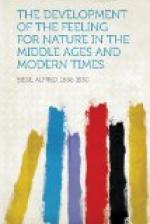In the last five examples the epic treatment and the personifications are noteworthy.
Comparisons from animal life are forcible and striking:
How like a deer, stricken by many
princes,
Dost thou lie here! (Julius Caesar.)
Richard III. is called:
The wretched bloody and usurping boar
That spoil’d your summer fields and fruitful vines,
Swills your warm blood like wash and makes his trough
In your embowell’d bosoms; this foul swine
Lies now even in the centre of this isle.
The tiger now hath seized the gentle hind.
(Richard III.)
The smallest objects are noted:
As flies to wanton boys are we to
the gods;
They kill us for their sport. (King Lear.)
Marcus: Alas! my lord, I have but kill’d a fly.
Titus: But how if that fly had a father and a mother?
How would he hang his slender gilded wings,
And buzz lamenting doings in the air!
Poor harmless fly!
That, with his pretty buzzing melody,
Came here to make us merry! and thou
Hast kill’d him!
(Titus Andronicus.)
Shakespeare has abundance of this idyllic miniature painting, for which all the literature of the day shewed a marked taste.
Tamora says:
My lovely Aaron, wherefore look’st thou sad,
When everything doth make a gleeful boast?
The birds chant melody on every bush,
The snake lies rolled in the cheerful sun,
The green leaves quiver with the cooling wind
And make a chequer’d shadow on the ground.
(Titus Andronicus.)
And Valentine in Two Gentlemen of Verona:
This shadowy desert, unfrequented woods,
I better brook than flourishing peopled towns;
Here can I sit alone, unseen of any,
And to the nightingale’s complaining notes
Tune my distresses and record my woes.
Like this, in elegiac sentimentality, is Romeo:
Before
the worshipp’d sun
Peer’d forth the golden window of
the east....
Many a morning hath he there been seen
With tears augmenting the fresh morning’s
dew.
Cymbeline, Winter’s Tale, and As You Like It are particularly rich in idyllic traits; the artificiality of court life is contrasted with life in the open; there are songs, too, in praise of woodland joys:
Under the greenwood tree
Who loves to lie with me,
And tune his merry note
Unto the sweet bird’s throat,
Come hither, come hither, come hither!
Here shall he see
No enemy
But winter and rough weather.
(As
You Like It.)




